GENG FU XING
4.6/5
707 Reviews
No. 1 of Local Restaurants in Wuhu
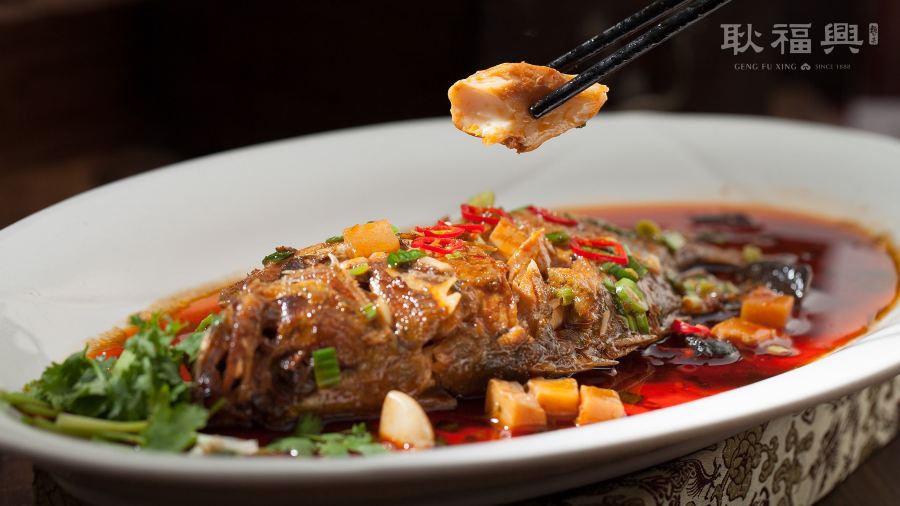
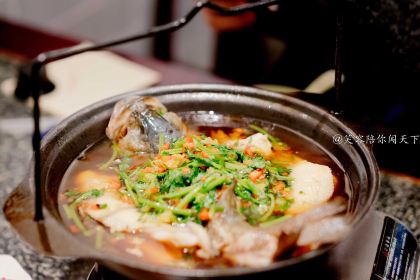
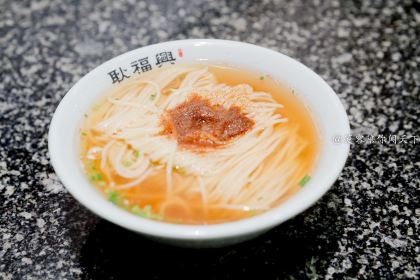
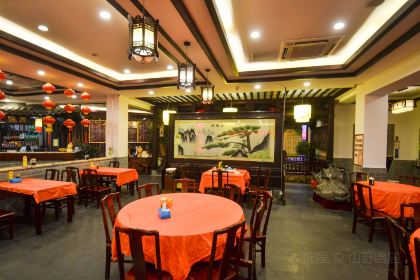
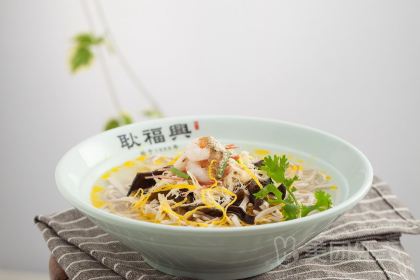
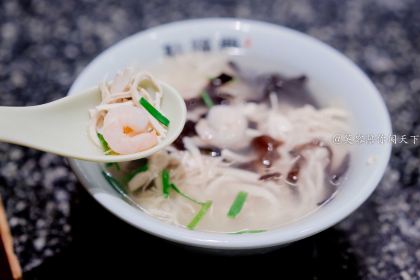
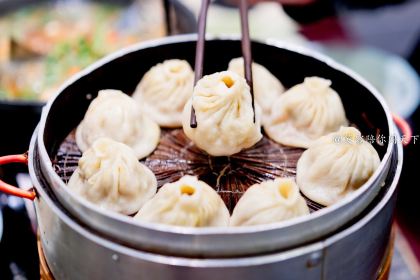
More
Open Now|06:30-14:00Show more
+865533845577
10 Phoenix Food Street
 M49***48**Geng Fuxing: A taste epic of Jiangcheng cooked in a century-old stove**
Founded in 1888, Geng Fuxing has built a living museum of Anhui cuisine in Wuhu Fenghuang Food Street with bluestone counters, eight-immortal square tables and mottled copper hanging pots. This time-honored shop, which carries the taste memories of three generations of Jiangcheng people, uses steaming steam to refine the food culture of southern Anhui into nostalgia on the tip of the tongue.
**Shrimp roe noodles: the most delicious aesthetics gifted by the Yangtze River**
At five in the morning, the master chef began to boil the bone soup - the eel bones and tube bones were rolled in the pottery pot for eight hours, and the Yangtze River shrimp roe was sprinkled in when the soup was milky white. The thin noodles fell neatly into the bowl, and when the soup was poured, the shrimp roe floated with the heat wave, like stars falling into the Milky Way. The moment you take a bite, the salty fragrance of the river fresh and the mellowness of the bone soup burst on the tip of your tongue, and with a spoonful of secret spicy oil, it is like the river water stirring the rocks, awakening the "river fresh worship" in the genes of Wuhu people.
** Crispy sesame cake: the time and space code tempered by charcoal fire**
In front of the open stall facing the street, the master holds a long tong to turn the sesame cake, and the charcoal fire of the old furnace reflects the vicissitudes of life on his face. Lard and chives are kneaded into the dough, sprinkled with sesame seeds and baked against the wall of the furnace. When it comes out of the oven, the crispy skin is as white as snow. The moment you bite it open, the fragrance of onion and burnt aroma gushes out, and the crispness and softness symphony between your teeth. The power of a century of inheritance is all hidden in this three-fold and nine-kneading process. With a bowl of red bean wine, it is sweet and refreshing, which is the soul of Jiangcheng morning tea.
** Crab roe soup dumplings: Jiangnan quatrains with fragrance on your fingers**
The golden ratio of crab roe and pork mince is now opened, and the master uses 32 folds to lock it into the thin dough. When it is lifted and moved slowly, the soup shakes like amber in the skin, and a sip of it is so fresh that it makes your eyebrows fall. Amid the chatter of old tea drinkers by the window, waiters shuttled back and forth with steamers. When the wooden tray was opened, white mist rolled up, and it seemed as if I had returned to the bustling morning light of Dajiaxiang during the Guangxu period.
From the stalls of Dajiaxiang in the Qing Dynasty to the intangible cultural heritage protection unit today, Geng Fuxing used the boiling years in the copper hanging pot to stew the Jianghu spirit, wharf soul, and Jiangnan charm of Wuhu into a bowl of vivid city memory.
(Word count: 300)
---
**Food Guide**
- Three must-order dishes: shrimp roe noodles (15 yuan/bowl), crispy sesame cakes (2 yuan/piece), and crab roe soup dumplings (28 yuan/cage)
- During the morning tea period (6:00-9:30), you can experience the tradition of waiters singing the menu. The second-floor private rooms must be booked in advance
- Head office address: No. 10 Fenghuang Food Street, Jinghu District, 15 minutes walk from Binjiang Park
- Cultural Easter eggs: The store displays century-old noodle-making tools, and the intangible cultural heritage souvenir "shrimp roe sauce" can be purchased at the cashier
M49***48**Geng Fuxing: A taste epic of Jiangcheng cooked in a century-old stove**
Founded in 1888, Geng Fuxing has built a living museum of Anhui cuisine in Wuhu Fenghuang Food Street with bluestone counters, eight-immortal square tables and mottled copper hanging pots. This time-honored shop, which carries the taste memories of three generations of Jiangcheng people, uses steaming steam to refine the food culture of southern Anhui into nostalgia on the tip of the tongue.
**Shrimp roe noodles: the most delicious aesthetics gifted by the Yangtze River**
At five in the morning, the master chef began to boil the bone soup - the eel bones and tube bones were rolled in the pottery pot for eight hours, and the Yangtze River shrimp roe was sprinkled in when the soup was milky white. The thin noodles fell neatly into the bowl, and when the soup was poured, the shrimp roe floated with the heat wave, like stars falling into the Milky Way. The moment you take a bite, the salty fragrance of the river fresh and the mellowness of the bone soup burst on the tip of your tongue, and with a spoonful of secret spicy oil, it is like the river water stirring the rocks, awakening the "river fresh worship" in the genes of Wuhu people.
** Crispy sesame cake: the time and space code tempered by charcoal fire**
In front of the open stall facing the street, the master holds a long tong to turn the sesame cake, and the charcoal fire of the old furnace reflects the vicissitudes of life on his face. Lard and chives are kneaded into the dough, sprinkled with sesame seeds and baked against the wall of the furnace. When it comes out of the oven, the crispy skin is as white as snow. The moment you bite it open, the fragrance of onion and burnt aroma gushes out, and the crispness and softness symphony between your teeth. The power of a century of inheritance is all hidden in this three-fold and nine-kneading process. With a bowl of red bean wine, it is sweet and refreshing, which is the soul of Jiangcheng morning tea.
** Crab roe soup dumplings: Jiangnan quatrains with fragrance on your fingers**
The golden ratio of crab roe and pork mince is now opened, and the master uses 32 folds to lock it into the thin dough. When it is lifted and moved slowly, the soup shakes like amber in the skin, and a sip of it is so fresh that it makes your eyebrows fall. Amid the chatter of old tea drinkers by the window, waiters shuttled back and forth with steamers. When the wooden tray was opened, white mist rolled up, and it seemed as if I had returned to the bustling morning light of Dajiaxiang during the Guangxu period.
From the stalls of Dajiaxiang in the Qing Dynasty to the intangible cultural heritage protection unit today, Geng Fuxing used the boiling years in the copper hanging pot to stew the Jianghu spirit, wharf soul, and Jiangnan charm of Wuhu into a bowl of vivid city memory.
(Word count: 300)
---
**Food Guide**
- Three must-order dishes: shrimp roe noodles (15 yuan/bowl), crispy sesame cakes (2 yuan/piece), and crab roe soup dumplings (28 yuan/cage)
- During the morning tea period (6:00-9:30), you can experience the tradition of waiters singing the menu. The second-floor private rooms must be booked in advance
- Head office address: No. 10 Fenghuang Food Street, Jinghu District, 15 minutes walk from Binjiang Park
- Cultural Easter eggs: The store displays century-old noodle-making tools, and the intangible cultural heritage souvenir "shrimp roe sauce" can be purchased at the cashierReviews of GENG FU XING
Some reviews may have been translated by Google Translate
4.6/5Outstanding
All (707)
Latest
Photo reviews (272)
Positive reviews (68)
Negative reviews (3)
**Geng Fuxing: A taste epic of Jiangcheng cooked in a century-old stove** Founded in 1888, Geng Fuxing has built a living museum of Anhui cuisine in Wuhu Fenghuang Food Street with bluestone counters, eight-immortal square tables and mottled copper hanging pots. This time-honored shop, which carries the taste memories of three generations of Jiangcheng people, uses steaming steam to refine the food culture of southern Anhui into nostalgia on the tip of the tongue. **Shrimp roe noodles: the most delicious aesthetics gifted by the Yangtze River** At five in the morning, the master chef began to boil the bone soup - the eel bones and tube bones were rolled in the pottery pot for eight hours, and the Yangtze River shrimp roe was sprinkled in when the soup was milky white. The thin noodles fell neatly into the bowl, and when the soup was poured, the shrimp roe floated with the heat wave, like stars falling into the Milky Way. The moment you take a bite, the salty fragrance of the river fresh and the mellowness of the bone soup burst on the tip of your tongue, and with a spoonful of secret spicy oil, it is like the river water stirring the rocks, awakening the "river fresh worship" in the genes of Wuhu people. ** Crispy sesame cake: the time and space code tempered by charcoal fire** In front of the open stall facing the street, the master holds a long tong to turn the sesame cake, and the charcoal fire of the old furnace reflects the vicissitudes of life on his face. Lard and chives are kneaded into the dough, sprinkled with sesame seeds and baked against the wall of the furnace. When it comes out of the oven, the crispy skin is as white as snow. The moment you bite it open, the fragrance of onion and burnt aroma gushes out, and the crispness and softness symphony between your teeth. The power of a century of inheritance is all hidden in this three-fold and nine-kneading process. With a bowl of red bean wine, it is sweet and refreshing, which is the soul of Jiangcheng morning tea. ** Crab roe soup dumplings: Jiangnan quatrains with fragrance on your fingers** The golden ratio of crab roe and pork mince is now opened, and the master uses 32 folds to lock it into the thin dough. When it is lifted and moved slowly, the soup shakes like amber in the skin, and a sip of it is so fresh that it makes your eyebrows fall. Amid the chatter of old tea drinkers by the window, waiters shuttled back and forth with steamers. When the wooden tray was opened, white mist rolled up, and it seemed as if I had returned to the bustling morning light of Dajiaxiang during the Guangxu period. From the stalls of Dajiaxiang in the Qing Dynasty to the intangible cultural heritage protection unit today, Geng Fuxing used the boiling years in the copper hanging pot to stew the Jianghu spirit, wharf soul, and Jiangnan charm of Wuhu into a bowl of vivid city memory. (Word count: 300) --- **Food Guide** - Three must-order dishes: shrimp roe noodles (15 yuan/bowl), crispy sesame cakes (2 yuan/piece), and crab roe soup dumplings (28 yuan/cage) - During the morning tea period (6:00-9:30), you can experience the tradition of waiters singing the menu. The second-floor private rooms must be booked in advance - Head office address: No. 10 Fenghuang Food Street, Jinghu District, 15 minutes walk from Binjiang Park - Cultural Easter eggs: The store displays century-old noodle-making tools, and the intangible cultural heritage souvenir "shrimp roe sauce" can be purchased at the cashier
Whenever my friends from other places come to visit, we always go to the main store in the food court. The three-piece set of soup dumplings, shrimp noodles and boiled dried shredded vegetables is served. Of course, one portion is crab roe and the other is pure meat. In addition, there is also jade siu mai, which is also very refreshing. The fragrant sesame balls, crisp spring rolls, and my favorite steamed pork with rice flour are delicious and very satisfying.
This is a local Chinese time-honored store. I like the noodles here the most. The portion is very big and the soup is delicious! The snacks here are also very delicious and the portion is moderate. Many people come to eat here! !
The crab roe soup dumplings provided by Geng Fuxing are well-known. The crab roe soup dumplings are made of crab, fresh meat skin, pork belly, refined white flour, and are made with sugar, soy sauce, chopped green onion, minced ginger, fine salt and other ingredients. Geng Fuxing's crab roe soup dumplings are made with fine ingredients and are carefully made. They need to go through multiple processes such as making skin soup, stuffing, rolling skin, and pinching. It took half an hour to queue up for a seat during the National Day holiday. The business was so good.
In 2014, CCTV's "A Bite of China II" visited Geng Fuxing to film the entire process of making shrimp rod noodles. Geng Fuxing is the only filming location for shrimp roe noodles in China; in 20 years, the National Tourism Administration recognized the first batch of gold medal tourist snacks in the country, and Geng Fuxing shrimp roe noodles were introduced into the country again; in 2017, the China Hotel Association awarded the Xiaolong Soup Dumplings the Gold Award for Chinese Traditional Cultural Snacks.
We waited for more than an hour just for Geng Fuxing, the most popular food in Wuhu City, A Bite of China, the intangible cultural heritage of crab roe soup dumplings, shrimp roe noodles, and crispy sesame cakes. To be honest, the shrimp roe noodles tasted really good, and the crispy sesame cakes were crispy on the outside and crispy on the inside, crispy and delicious. However, the most famous crab roe soup dumplings were not as delicious as I imagined.